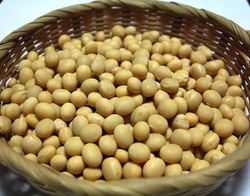
Many vegetarians and vegans eat soy products such as myself, most common is soymilk. Over the past decade, soy foods and good health have become inextricably linked in the national consciousness. According to annual U.S. consumer attitude surveys by the United Soybean Board, 85 percent of those polled in 2008 rated soy products as "healthy," a significant increase from the 59 percent who in 1997 thought this was the case.
Whole soy products like tofuare a good source of vegetarian protein, and fermented soy products like tempeh and miso are easier to digest than tofu, because the fermentation converts sugars that cause gas or other reactions. I think its fine to eat small quantities of those foods, if you have no adverse reactions.
Rumors about the negative effects soy products have on men are rampant. Soy has an extraordinary amount of estrogen in it - every 100 grams of soy protein you consume has as much estrogen as a high-dose birth control pill! This is said to be especially damaging to infants, making soy formula particularly vital to avoid, but it's dangerous to men – many believe it's responsible for the recent rash of "man-boobs" hitting America - and women. But let’s not blame it all on the soy, most process foods these days are filled with growth hormones and other unhealthy stuff.
I personally recommend my male friends/family to lower the soy consumption, since it's better to be on the safe side!
But don’t fear! Generations of Asians have regularly consumed soy products without fertility disorders, and Asian countries have prodigiously produced very healthy, highly functioning children for centuries. According to New Scientist, “Chavarro admits that many East Asian men consume much more soya than the participants in his trial and do not develop fertility problems. He speculates that his study found a link between soya and low sperm count because many of the participants were overweight or obese. Men with high levels of body fat produce more estrogen than their slim counterparts.”
If you are unsure, there are other alternatives such as hemp milk and almond milk.
Whole soy products like tofuare a good source of vegetarian protein, and fermented soy products like tempeh and miso are easier to digest than tofu, because the fermentation converts sugars that cause gas or other reactions. I think its fine to eat small quantities of those foods, if you have no adverse reactions.
Rumors about the negative effects soy products have on men are rampant. Soy has an extraordinary amount of estrogen in it - every 100 grams of soy protein you consume has as much estrogen as a high-dose birth control pill! This is said to be especially damaging to infants, making soy formula particularly vital to avoid, but it's dangerous to men – many believe it's responsible for the recent rash of "man-boobs" hitting America - and women. But let’s not blame it all on the soy, most process foods these days are filled with growth hormones and other unhealthy stuff.
I personally recommend my male friends/family to lower the soy consumption, since it's better to be on the safe side!
But don’t fear! Generations of Asians have regularly consumed soy products without fertility disorders, and Asian countries have prodigiously produced very healthy, highly functioning children for centuries. According to New Scientist, “Chavarro admits that many East Asian men consume much more soya than the participants in his trial and do not develop fertility problems. He speculates that his study found a link between soya and low sperm count because many of the participants were overweight or obese. Men with high levels of body fat produce more estrogen than their slim counterparts.”
If you are unsure, there are other alternatives such as hemp milk and almond milk.